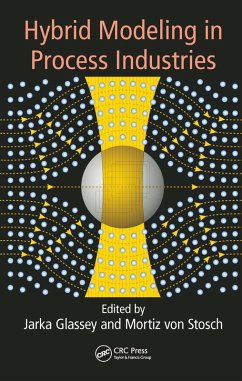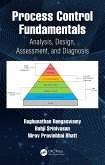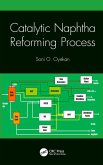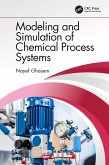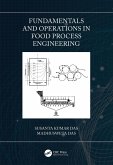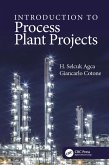Hybrid Modeling in Process Industries (eBook, ePUB)
Redaktion: Glassey, Jarka; Stosch, Moritz von
47,95 €
47,95 €
inkl. MwSt.
Sofort per Download lieferbar

24 °P sammeln
47,95 €
Als Download kaufen

47,95 €
inkl. MwSt.
Sofort per Download lieferbar

24 °P sammeln
Jetzt verschenken
Alle Infos zum eBook verschenken
47,95 €
inkl. MwSt.
Sofort per Download lieferbar
Alle Infos zum eBook verschenken

24 °P sammeln
Hybrid Modeling in Process Industries (eBook, ePUB)
Redaktion: Glassey, Jarka; Stosch, Moritz von
- Format: ePub
- Merkliste
- Auf die Merkliste
- Bewerten Bewerten
- Teilen
- Produkt teilen
- Produkterinnerung
- Produkterinnerung

Bitte loggen Sie sich zunächst in Ihr Kundenkonto ein oder registrieren Sie sich bei
bücher.de, um das eBook-Abo tolino select nutzen zu können.
Hier können Sie sich einloggen
Hier können Sie sich einloggen
Sie sind bereits eingeloggt. Klicken Sie auf 2. tolino select Abo, um fortzufahren.

Bitte loggen Sie sich zunächst in Ihr Kundenkonto ein oder registrieren Sie sich bei bücher.de, um das eBook-Abo tolino select nutzen zu können.
The book is based on contributions of leading experts in the field and it covers both hybrid modeling fundamentals and their applications. The application part covers the utilization of hybrid modeling for typical process operation and design applications in industries such as chemical, petrochemical, biochemical, food and pharmaceutical process engineering.
.
- Geräte: eReader
- mit Kopierschutz
- eBook Hilfe
- Größe: 10.19MB
Andere Kunden interessierten sich auch für
![Metal-Organic Frameworks-Based Hybrid Materials for Environmental Sensing and Monitoring (eBook, ePUB) Metal-Organic Frameworks-Based Hybrid Materials for Environmental Sensing and Monitoring (eBook, ePUB)]() Metal-Organic Frameworks-Based Hybrid Materials for Environmental Sensing and Monitoring (eBook, ePUB)182,95 €
Metal-Organic Frameworks-Based Hybrid Materials for Environmental Sensing and Monitoring (eBook, ePUB)182,95 €![Digital Transformation for the Process Industries (eBook, ePUB) Digital Transformation for the Process Industries (eBook, ePUB)]() Osvaldo A. BascurDigital Transformation for the Process Industries (eBook, ePUB)119,95 €
Osvaldo A. BascurDigital Transformation for the Process Industries (eBook, ePUB)119,95 €![Process Control Fundamentals (eBook, ePUB) Process Control Fundamentals (eBook, ePUB)]() Raghunathan RengaswamyProcess Control Fundamentals (eBook, ePUB)115,95 €
Raghunathan RengaswamyProcess Control Fundamentals (eBook, ePUB)115,95 €![Catalytic Naphtha Reforming Process (eBook, ePUB) Catalytic Naphtha Reforming Process (eBook, ePUB)]() Soni OyekanCatalytic Naphtha Reforming Process (eBook, ePUB)48,95 €
Soni OyekanCatalytic Naphtha Reforming Process (eBook, ePUB)48,95 €![Modeling and Simulation of Chemical Process Systems (eBook, ePUB) Modeling and Simulation of Chemical Process Systems (eBook, ePUB)]() Nayef GhasemModeling and Simulation of Chemical Process Systems (eBook, ePUB)140,95 €
Nayef GhasemModeling and Simulation of Chemical Process Systems (eBook, ePUB)140,95 €![Fundamentals and Operations in Food Process Engineering (eBook, ePUB) Fundamentals and Operations in Food Process Engineering (eBook, ePUB)]() Susanta Kumar DasFundamentals and Operations in Food Process Engineering (eBook, ePUB)125,95 €
Susanta Kumar DasFundamentals and Operations in Food Process Engineering (eBook, ePUB)125,95 €![Introduction to Process Plant Projects (eBook, ePUB) Introduction to Process Plant Projects (eBook, ePUB)]() H. Selcuk AgcaIntroduction to Process Plant Projects (eBook, ePUB)47,95 €
H. Selcuk AgcaIntroduction to Process Plant Projects (eBook, ePUB)47,95 €-
-
-
The book is based on contributions of leading experts in the field and it covers both hybrid modeling fundamentals and their applications. The application part covers the utilization of hybrid modeling for typical process operation and design applications in industries such as chemical, petrochemical, biochemical, food and pharmaceutical process engineering.
.
.
Dieser Download kann aus rechtlichen Gründen nur mit Rechnungsadresse in A, B, BG, CY, CZ, D, DK, EW, E, FIN, F, GR, HR, H, IRL, I, LT, L, LR, M, NL, PL, P, R, S, SLO, SK ausgeliefert werden.
Produktdetails
- Produktdetails
- Verlag: Taylor & Francis eBooks
- Seitenzahl: 231
- Erscheinungstermin: 1. Februar 2018
- Englisch
- ISBN-13: 9781351184359
- Artikelnr.: 52460363
- Verlag: Taylor & Francis eBooks
- Seitenzahl: 231
- Erscheinungstermin: 1. Februar 2018
- Englisch
- ISBN-13: 9781351184359
- Artikelnr.: 52460363
- Herstellerkennzeichnung Die Herstellerinformationen sind derzeit nicht verfügbar.
Dr. Jarka Glassey currently works as a Professor of Chemical engineering education in the School of Engineering, Newcastle University, United Kingdom. She gained her academic qualifications in chemical engineering at the STU Bratislava, Slovakia, and PhD in biochemical process modeling at Newcastle University, United Kingdom. She is a Chartered Engineer, Fellow of the Institution of Chemical Engineers (IChemE), Rugby, UK, and currently serves on the IChemE Council. She is the Executive Vice President of the European Society of Biochemical Engineering Sciences (ESBES), and she is also the vice chair (immediate past chair) of the Modelling, Monitoring, Measurement & Control (M3C) Section of ESBES. Her research interests are particularly in the areas of bioprocess modeling, monitoring, whole process development, and optimization. She has published extensively in this area and over the years collaborated with a wide range of industrial partners in real-life bioprocess development and modeling applications. Currently she is coordinating a large European academic and industrial consortium carrying out research and training early career researchers in the use of the QbD, PAT and hybrid modeling approaches within biopharma industry in order to speed up the process development and reduce the lead times from discovery to full scale manufacture. Dr. Moritz von Stosch joined the Technical Research and Development Department of GSK Vaccines in the beginning of 2017. Until then, he had worked as a Lecturer in Chemical Engineering at the School of Chemical Engineering and Advanced Materials, Newcastle University, Newcastle upon Tyne, UK, and he also was the team leader of HybPAT, a spin-off initiative with the aim of providing hybrid modeling solutions for an efficient implementation of PAT. In 2011 he earned his PhD at the Faculty of Engineering of the University of Porto, Porto, Portugal. He was awarded his diploma in engineering from the RWTH-Aachen University in Germany. Moritz von Stosch is a leading expert on hybrid modeling methods and their application to bioprocess problems. He is, for example, the author of more than ten publications on hybrid modeling and coauthor of several others. In the past years, he co-organized an expert meeting on "Hybrid Modeling for QbD and PAT in Biopharma," which was integrated into the ESBES M3C panel series, and he also co-organized all three bi-annually hold hybrid modeling summer schools. In addition, he gave a number of invited talks on "Hybrid modeling for QbD and PAT" across Europe and the United States.
1. Benefits and challenges of hybrid modelling in the process industries:
An introduction. 2. Hybrid Model Structures for Knowledge Integration. 3.
Hybrid models and Experimental Design. 4. Hybrid model identification and
discrimination with practical examples from the chemical industry. 5.
Hybrid modeling of biochemical processes. 6. Hybrid modelling of
petrochemical processes. 7. Implementation of hybrid neural models to
predict the behaviour of food transformation and food waste valorisation
processes. 8. Hybrid modelling of pharmaceutical processes and PAT.
An introduction. 2. Hybrid Model Structures for Knowledge Integration. 3.
Hybrid models and Experimental Design. 4. Hybrid model identification and
discrimination with practical examples from the chemical industry. 5.
Hybrid modeling of biochemical processes. 6. Hybrid modelling of
petrochemical processes. 7. Implementation of hybrid neural models to
predict the behaviour of food transformation and food waste valorisation
processes. 8. Hybrid modelling of pharmaceutical processes and PAT.
1. Benefits and challenges of hybrid modelling in the process industries:
An introduction. 2. Hybrid Model Structures for Knowledge Integration. 3.
Hybrid models and Experimental Design. 4. Hybrid model identification and
discrimination with practical examples from the chemical industry. 5.
Hybrid modeling of biochemical processes. 6. Hybrid modelling of
petrochemical processes. 7. Implementation of hybrid neural models to
predict the behaviour of food transformation and food waste valorisation
processes. 8. Hybrid modelling of pharmaceutical processes and PAT.
An introduction. 2. Hybrid Model Structures for Knowledge Integration. 3.
Hybrid models and Experimental Design. 4. Hybrid model identification and
discrimination with practical examples from the chemical industry. 5.
Hybrid modeling of biochemical processes. 6. Hybrid modelling of
petrochemical processes. 7. Implementation of hybrid neural models to
predict the behaviour of food transformation and food waste valorisation
processes. 8. Hybrid modelling of pharmaceutical processes and PAT.
